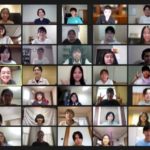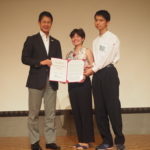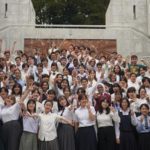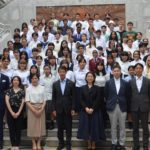Hiroshima Junior International ForumHiroshima Declaration/ Group B
<Preamble>
We, the 30 participants of the 5th Hiroshima Junior International Forum, held on November 29th, December 6th and 13th 2020, collaborated together online from 14 countries to learn about and discuss the abolition of nuclear weapons as well as peace-building.
In 2020, the world has been massively influenced by the COVID-19 pandemic. However, it has not hampered the enthusiasm of us, the younger generation, to learn about the challenges of the world and together discuss what we should do to make the world a better place.
Supported by the strong will of the people of Hiroshima and their desire for action, we, the youth of today, learned about nuclear weapon abolition and peacebuilding, had three wonderful days filled with disarmament learning and mutual understanding. Together, we listened to lectures from both Atomic-bomb survivors, experts on nuclear disarmament and peacebuilding, and then discussed the challenges we face in finding solutions for these two fundamentally critical issues.
We have incorporated the results of our learning and discussions in this Hiroshima Declaration. This Hiroshima Declaration is an action plan for us as participants and also a proposal that we hope to share with like-minded people around the world.
<Challenges and Solutions for Abolitions of Nuclear Weapons>
Nuclear weapons have been a threat to humanity as a whole throughout their development in the last century. From the first use of the atomic bomb on Japan during World War II to the Cuban missile crisis that almost started a global nuclear war, the calls on the total abolition of nuclear weapons by all states are strong around the world. Towards nuclear weapons abolition, we recognize two main threats: the potential threat of an international nuclear arms race as well as distrust built between nations, caused not only by the continued development and possession of nuclear devices for warfare. This is compounded by the lack of recognition of new voices on the topic, lack of communications between governments and cultures through conferences and projects, and lack of opportunities for populations to be informed on this matter.
For this challenge, we suggest nations and organizations promote and sign internationally recognized treaties and campaigns towards nuclear abolishment, namely the International Campaign to Abolish Nuclear Weapons (ICAN), the Treaty on the Prohibition of Nuclear Weapons (TPNW), and the Treaty on the Non-Proliferation of Nuclear Weapons (NPT), by establishing an educational system that informs citizens about the danger of nuclear weapons. This can be achieved by using scientific simulations and historical events such as Hiroshima and Nagasaki and the consequences they had on civilians through platforms such as public school textbooks, social community activities, announcements through governmental facilities, social media, and news resources. If the above is achieved, recognition of the harmful side of nuclear arms will be emphasized, thus, becoming the first step towards international nuclear consensus.
<Our Role for Abolition of Nuclear Weapons>
In Hiroshima Peace Memorial Park, there is a monument on which is written “Let all the souls here rest in peace; we shall not repeat the evil.” to remind the world about Hiroshima’s tragedy. In fact, we play the most important role in spreading this message to the world. For this challenge, we commit to being informed about international situations, stories of Hiroshima, and the danger of nuclear weapons. We also seek to establish a system of spreading information regarding denuclearization through international social media such as making educational materials on nuclear disarmament and denuclearization which can be spread through social media.
We will discourage discrimination against nuclear victims by spreading their stories through promotional videos, social media posts, and international conferences. Finally, we urge the establishment of a system of sharing information regarding denuclearization through international social media separated into different teams for different regions to tackle the problem of differences in culture and media types.
<The Role of Hiroshima for Abolition of Nuclear Weapons>
The role of Hiroshima on this issue was also discussed. We believe that the Hiroshima local government should encourage people to communicate and discuss nuclear disarmament in depth and detail, provide materials that can be used to spread stories of Hiroshima and the use of nuclear weapons in the world through SNS and educational programs. We also ask for platforms to connect world youth to be produced and continued for sharing their opinions on the abolishment of nuclear weapons. In addition, Hiroshima should also try to inform the reality of nuclear weapons to less developed countries in order to prevent the production of nuclear weapons in less economically developed countries. By doing so, people should have their own voices on the use of nuclear weapons, which will ultimately make governments disarm. As this Hiroshima forum is an international forum, we hope that the government would help high schoolers to learn more about nuclear history and peace. On a bigger scale, Hiroshima should also ask federal and local governments from every country building trust among the world, and begin conversations about world peacebuilding by telling the stories of nuclear weapon victims like the Hibakusha.
<Challenges and Solutions for Peace-building>
Towards peacebuilding, we recognize the core of peace-building is the absence of inequality. By solving problems related to inequality, we can eliminate structural violence effectively and efficiently. The three biggest obstacles can be identified as wealth inequality: the difference between rich and poor, gender inequality: discrimination against men and women, and education inequality: different levels of opportunities for education. These problems exist in both developed and developing nations.
Wealth inequalities are mainly caused by geographical locations, destruction from past conflict, and a lack of resources. In our perspective, this can be solved by participating in programs and activities held by NGOs aiming for United Nations Sustainable Development Goals (UN SDGs) and donating to developing countries. Gender inequalities are mainly caused by historical beliefs and even culture itself. Especially in East Asia, patriarchy still occupies an important role in culture and religion especially in Confucianism culture. This makes the problem very difficult to be resolved. However, we can work towards gender equality by implementing gender equality related materials into the school systems and promoting gender equality through social media platforms. Lastly, education inequalities are caused by different states of development in regions, economic inequality, and the general lack of technology. This problem is heavily related to the two stated above: wealth inequality and gender inequality. If poverty and gender discrimination decrease, then the opportunities for education will increase. Hence, as the younger generation, we shall follow the guidelines above, and spread the words under the supervision of the Hiroshima government, which will be responsible for supporting these events with its resources and platforms.
<Our Role for Peace-building>
As we are a young generation, the first thing we have to do is to learn more about PEACE first. There are many ways to build peace but it also depends on each country and the government too. People around the world should also be united as one. If we all have one goal, universal peace, then it might be possible to stop nuclear weapons development. Our voices are really necessary and vital for world peace.
For the promotion of peace, we would like to spread the goal of globalization through social media, as well as the creation of and participation in international platforms and forums like HJIF which connect people in the world by gathering opinions from all over the world. Furthermore, we strongly commit ourselves to finding ways to promote and raise this issue around the world and help to make people realize the thoughts of some sections in society about these issues are wrong.
<The Role of Hiroshima for Peace-building>
We sincerely hope Hiroshima can contribute to help the world to build peace, and educate more people like us on the topic. Specifically, Hiroshima should make a particular education program for schools. It is difficult for children to take action, but it is important to increase their knowledge about global issues, so that in the near future, they can realize the right path to reach world peace. Therefore, we concluded that education is essential to reach a global consensus on the topic.
Another role of Hiroshima will be to encourage young people to actively take part in the proposed solutions above related to peace-building around the world. This can not only increase support to the people who need it but also increase international connections and communication, which ultimately improves international relations.
<Closing>
We, the participants of this forum, learned the importance of the ongoing process as we found about the challenges for world peace, the search for the causes of those challenges, and also how to find and develop solutions. We also learned that we can enhance our understanding of the challenges and reach more comprehensive solutions by talking to people from diverse backgrounds with mutual respect.
We know that our responsibilities do not end with the completion of the Hiroshima Declaration. We know we need to put the action plan presented here into practice, and we need to interact with people to share our suggestions. And when interacting with other people, we will make sure we value diversity and respect each other, just as we did in the dialogues that took place between us participants. Through such efforts, we believe that we can make strong ties among people around the world, and achieve results on nuclear abolition, peacebuilding, and other fundamentally vital issues. In this way, we believe that our efforts can lead the world to a better place.
The world we live in is facing many challenges and difficulties. It is time for us to take decisive and concrete actions. As global citizens and future young leaders of the world, we are here to make small changes for bigger changes towards a fully denuclearized, demilitarized, and peaceful world. Recognizing our power and responsibilities, we hereby strongly declare our determination.
December 13, 2020
関連情報
ひろしまジュニア国際フォーラムについて
ひろしまジュニア国際フォーラムについて
この記事に関連付けられているタグ








